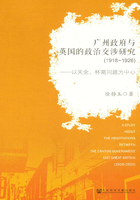
第2章 Abstract
This book is a study about the negotiations between the Canton Government and Great Britain from 1918 to 1926. In the 1920's, the relation between China and Great Britain was in an important era of change. After the First World War, because of the diminishing of its power, gradually sliding from the status of top Power in China, the Great Britain had to defend its interests in China by relying on the coordination of Big Powers. After the May Fourth Movement, the nationalist movement grew in China, accompanied by anti-imperialist movements rising one after another. Moreover, the confrontation between the Beijing Government and the Canton Government compelled Great Britain to face the dilemma. The Beijing Gov-ernment tried to raise the status of China by legislative methods with little success. On the contrary, supported by the people and the Soviet Russia, the Canton Government carried out revolutionary national diplomacy. Great Britain was heavily defeated and had no choice but to change its policies about China. The ne-gotiations about the Customs surplus, Shakee Massacre and the anti-Britain boycott constituted the essential aspects of the negotiations between the Canton Government and Great Britain. Therefore, this book mainly discusses the negotiations about the Customs Surplus, Shakee Massacre and the anti-Britain boycott movement between the Canton Government and Great Britain. The text is divided into six chapters.
The first chapter focuses on the negotiations during the military government period. First, it provides an overview of the origin of the Customs Surplus, the illegal control of the foreign Powers and the main position of Great Britain in this issue. Secondly, it discusses the first effort of the Canton Government for the Customs Surplus, and the policy of Great Britain. Thirdly, in order to defend her own interests, Great Britain tried her best to push the North to consent to circulating one part of the surplus to the South Government, and the South Government greatly benefited from the surplus. Lastly, the negotiations over the Customs Surplus happened after the reestablishment of the Military Government. At the same time, the national diplomacy was dated back to its origin.
The second chapter focuses on the negotiations over the Customs Surplus during the Sun Yat-sen as the Marshal of the Canton Government. Firstly, it discusses the policy of the Canton Government about the Customs Surplus, the struggle of the Canton Government for the Customs Surplus and the support of the people, discovering the beginning of the national diplomacy. Secondly, it discusses the policy of Great Britain and the differences among the Powers. Thirdly, it analyses the disppearing of the crisis and the significance of the negotiations over the Customs Surplus.
The third chapter focuses on the rise of the boycott movement. Firstly, it discusses the negotiations over the Shakee massacre, narrating the attitudes and policies of the related parts and discussing the development of national diplomacy. Secondly, it discusses the effect of the anti-Britain boycott and the origin of the boycott. Lastly, it discusses the formulation and enforcement of the policy to isolate Britain and the countermeasures of Great Britain.
The fourth chapter focuses on the initial negotiations for settling the boycott. The Canton government formulated the policy of settling the boycott movement, while Chinese businessmen from Hong Kong strove to mediate the boycott movement. After the new Governor of Hong Kong Sir Cecil Clementi took up the official post, the policy of Great Britain also changed. So, several informal negotiations were carried on between the Canton Government and Great Britain. But, because of the differences in the standpoint and policy between the two parts, the negotiations finally crushed.
The fifth chapter focuses on the second round of negotiations over the boycott movement between the Canton Government and Great Britain. The mission from the Soviet Union helped the Canton Government formulate the policy to settle the strike and boycott movement. Around the May 20thincident, the Canton Government and the Great Britain carried on several negotiations. Then the two parts firstly carried on a formal negotiation to settle the strike and boycott movement. But for many reasons, the negotiation never reached an agreement.
The sixth chapter focuses on the end of the boycott after the North Expedition. In order to support the North Expedition, in spite of different views in the revolutionary camp the Canton Government decided to settle the boycott movement. Suffering great losses, Great Britain also discussed several policies to settle the boycott movement, and decided to take up a limited military policy. Finally, the Canton Government put forward and enforced the method of taxes on imported and exported goods in order to end the strike and boycott movement. Great Britain ac-quiesced in the method, and started to think about new policies towards China.
This research shows that during the nationalism movement the Canton Government strove for the support of the people and struggled to promote the new diplomacy, i. e. the national diplomacy. Having striking revolutionary spirit, the diplomacy of the Canton Government obtained important achievement. But, because of the turbulence of the political situation and the immature diplomacy, the diplomacy of the Canton Government had some deficiencies. Because of the struggle of the Chinese people and the reluctance of the other Powers to take union actions out of consideration for their own interests, Great Britain had to give up some interests and brewed a new policy about China. But it must be remembered that suffering heavy losses, Great Britain conceded on some less important subjects in order to defend its main economic and political interests in China, without changing its principle of the policy towards China. Therefore, the struggle of China to obtain national independence and freedom still had a long way to go.
Key Words: Canton Government; Great Britain; Political Negotiations;Customs Surplus; Boycott Movement